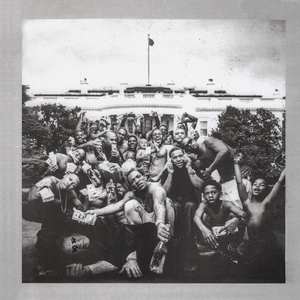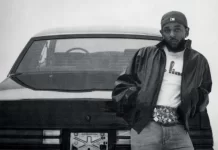Welcome to part four of my analysis of one of the last century’s most influential and densely pact albums. If you haven’t already, check out part one, two, and three. But now, let’s move on to the track “U” to uncover the great significance and emotional weight it carries within To Pimp a Butterfly.

Kendrick Lamar’s “u” is one of his most emotionally raw and authentic tracks, underscoring his guilt, self-hatred, and depression. The song is the merciless follow up to “These Walls.” Where “These Walls” was a song about power, revenge, and battles external to himself, “u” internalizes these. In this track, Kendrick exposes his deepest insecurities, using multiple voices to communicate his unsettled thoughts. Thoughts where he struggles with his past, his success, and his shortcomings, questioning his worth and his impact on those surrounding him.
Survivor’s Guilt:
The first verse begins with Kendrick confronting himself in a hotel room, spiraling into a breakdown. He is echoing the line “Loving you is complicated,” speaking to himself. This establishes the tone for the whole song. In this song he is unable to love himself since he views himself as a failure. Kendrick’s survivor’s guilt haunts him. He thinks about those he left behind in Compton, wondering why he escaped while others perished. His success does not give him peace of mind; rather, it alienates him. Teaching the listener that love cannot exist without self-love. Something which he currently lacks.
One of the most devastating moments is when he talks about a friend or family member who was killed while Kendrick was away seeking fame. He wasn’t there to assist or protect them, and the guilt consumes him. The line, “Where was your antennas? ” mocks him, as if asking why he wasn’t listening. Kendrick sees himself as selfish, as he abandoned those who needed him most.
This fuels his own self-hatred, as he believes that he is a hypocrite. He is a man who preaches brotherhood and loyalty, yet doesn’t practice these very things.

The Mirror of Fame and Isolation:
It is clear that fame has not freed Kendrick; it has trapped him in this cycle of solitude and regret. He reflects on how success has distanced him from his loved ones. He views himself as not human anymore, rather an icon. But such pressure only worsens his depression. The people closest to him are strangers now. Even when he tries to reach out, he’s afraid it’s too late as he sings “I can feel your vibe and recognized that you’re ashamed of me”.
However, one of the turning points is when he talks to a woman, likely a relative, who he hasn’t called in years. She tells him that he only calls her when he needs something. This hurts because it touches on his worst fear. The fear that he’s a selfish, hollow shell of the man he once was. Every success makes him feel further away from the man he used to be. The success that was meant to be a blessing has turned into another dark prison.
Alcohol and Self-Destruction:
The second half of the song takes a dramatic turn. Kendrick’s voice changes, becoming slurred and distorted to demonstrate his drunkenness. This section represents his complete mental collapse as he turns to alcohol to silence the voices in his head. But instead of finding relief, he sinks deeper into self-loathing.
Next, he screams at himself, calling himself a failure. He believes that he failed his community, and that his success is meaningless as it only benefits him. Moreover, the repetition of “You ain’t no brother, you ain’t no disciple” reflects his view of himself as a traitor and sinful man. He does not see himself as a leader or a role model, but a sham who abandoned his community for fame.

Kendrick also alludes to suicidal thoughts. The line “I probably die in a hotel room” is chilling, reflecting the loneliness and desperation he is enduring. He considers his own death to be inevitable, almost like an unstoppable current approaching closer and closer. Furthermore, the emptiness of his hotel room is a metaphor for his mind, as he is isolated from the world and drowning in remorse. This is the low point of the album’s immensely powerful storytelling, showing how low his guilt has brought him.
A Cycle of Pain:
By the end of the track, Kendrick is completely devastated. The voices in his head still attack him and don’t give room for salvation. Unlike other tracks where he finds resolution or even hope, “u” does not offer any easy answers. It forces listeners to sit with the weight of his pain, to deepen and solidify the somber and serious theme.
This song is crucial for To Pimp a Butterfly as it illustrates the emotional toll of Kendrick’s journey through fame and notoriety. In it, he’s battling himself as opposed to the more commonly depicted external circumstances and obstacles. This is a refreshing, yet real, insight into the common self struggles people endure. Moreover, the concepts of survivor’s guilt, self-hate, and depression resonate deeply with the overall struggles of Black men dealing with success, trauma, and expectations. While his pain is personal, it reflects a more expansive truth about success and its overwhelming power to deepen and open up thoughts of guilt and inner turmoil.
A Heartbreaking Reflection:
“u” is Kendrick at his most vulnerable. It strips away the confidence and control he typically presents, and leaves only raw emotion. The track deals with guilt, fame, and self-destruction in a unique way. It doesn’t offer comfort or closure, rather the cold unease of a man fighting himself. In the larger story of To Pimp a Butterfly, “u” clears the path for further introspection. The song makes way for songs like “Alright,” where Kendrick begins to find redemption. But for now, he’s lost, drowning in a mindset of regret and self-hatred. It’s that very honesty that makes “u” such a powerful and prominent song.

Tune in for Part Five:
I hope you have enjoyed my analysis of this immensely meaningful, yet tragic, song. Be ready for part five where I will analyze the song “Alright”. This is one of Kendrick’s most famous and notable songs on the album, blending personal pain, social commentary, and hope. I hope you are eager to learn more about this amazing album and the messages within it!






